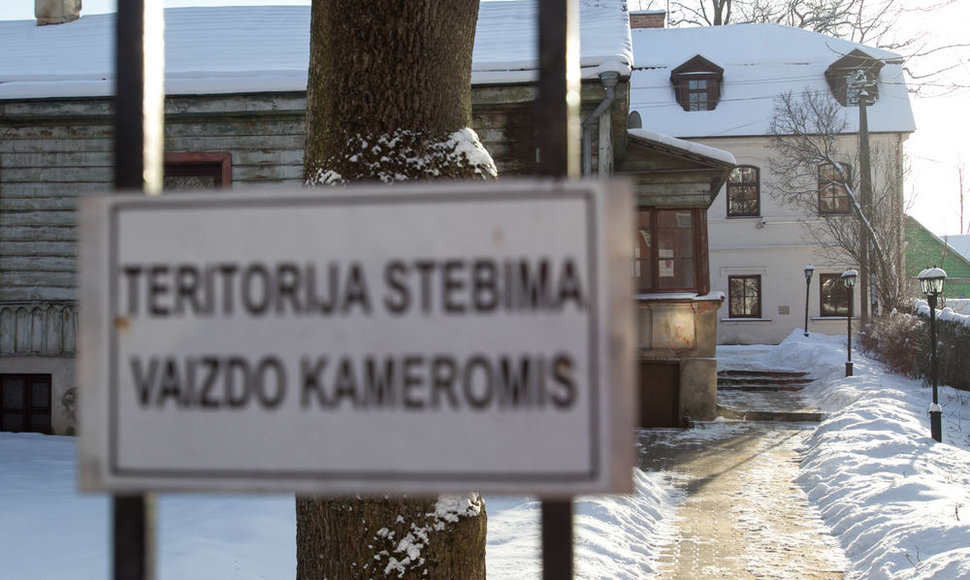A recent scandal – when at least five officers at the Lithuanian Migration Department were charged with selling residency permits to foreigners – has abated. Charges have been brought, officers suspended, and prosecutors are now taking time investigating the affair.
15min has learned of an old clock-work system that helps paying foreigners, who cannot or will not look for legal ways into the EU, live in Lithuania or use it as a gateway to other EU countries.
Life in hostels
Vilnius Railway Station is surrounded by numerous youth hostels offering tourists a cheap stay in the Lithuanian capital. One could hardly envisage that someone might live in them for as long as a year. And yet official data suggest otherwise – hundreds of foreigners on temporary residency permits have declared youth hostels as their place of residence.
One hostel on Šv. Stepono Street is closed. A sign on the door informs that accommodation services are discontinued due to technical issues. All lights are off. But this place officially houses 103 foreign nationals. They have declared this address as their permanent place of residence for the duration of their residency permit.
In order to qualify for a temporary residency permit in Lithuania, every non-EU national must supply the Migration Department with proof that he or she has a place to stay in the country.
Registration for a fee
Aleksadra, administrator of the hostel on Šv.Stepono street (called Come to Vilnius Hostel), is completely unsurprised when I ask her whether I could use the hostel address as my place of residence. She tells me, on the phone, that it should not be a problem and that, as far as she knows, some 30 to 50 people have already done that.
Aleksandra says she cannot take care of the paperwork, but she dictates the name of the owner of the building and his phone number. “Talk to him,” she advises politely.
Rolandas Kasparaitis, whose phone number it is that I get from the administrator of Come to Vilnius Hostel, is the director of Rolvinkas, a company that runs several hostels in Vilnius.
When I repeat my request to use one of his addresses as my place of residence, he does not flounder. Nor is he suspicious of my hastily made up story about a kid whom I want to sign up with a nearby kindergarten and therefore need an address in the neighbourhood.
“Aha, for one year? We charge one hundred euros for a year. Come the the hotel on Sodų Street tomorrow at 10, ask for Diana and tell her you spoke to Rolandas,” he gives the plan.
When I ask if he has more fictitious residents in his hotels, Kasparaitis volunteers that not among Lithuanians, only foreigners.
Matter of course
On the agreed hour, I hide a video camera in my purse and come to one of the hostels in the Railway Station district. I find a Diana, who, according to Kasparaitis, should take care of my fictitious residency papers.
The woman, who probably works as an accountant for the hostel, is much less trusting. She enquires why I need the declaration and how I know Rolandas. Moreover, she calls him to ascertain that my appointment has been properly arranged.
“Did he tell you it's gonna cost? 100 euros. You know that, right? Let's go then, give me your ID,” Diana leads me into administrative quarters of the hostel after talking to her boss.
She seems used to registering fictitious residents. When I ask if she is aware that some 100 foreign nationals are also registered at the place, she explains that they need it to be able to work.
“They work at Lithuanian companies. Certainly, we check whom we register,” Diana says, uneasily.
I later meet 35-year-old Kasparaitis. The director receives us at a kebab place in the basement of the hostel.
Two men greet us near a table covered with papers. Next to it stands Kasparaitis in sport jacket and shouts orders.
Does he feel it's all right to take money from foreigners who register their place of residence at the hostel and then use the document to apply for residency in Lithuania, I ask. Kasparaitis retorts these are unbecoming questions, declining to say how many such people “live” in his place.
“It's not that simple. Many organizations take part in this, both governmental and non-governmental. Just offering something in exchange for something else does not mean everything will work out. We first check what kind of a person we're dealing with, if he has a record or not. A declaration [of residency] does not guarantee anything,” Kasparaitis explains the procedure followed by foreigners.
The businessman observes that the media “is not the institution I should be explaining myself to,” but admits that he has been called on by law enforcement: “They come, we talk. The police, border control, migration have already enquired.”
149 companies in one flat
The Migration Department of the Ministry of the Interior is well aware that not everyone who applies for a residency permit in Lithuania is going to fully observe the law.
An inspection that the Ministry of the Interior carried out in the Migration Department has revealed that third country nationals usually come to Lithuania with the help of fictitious companies and fictitious residency declarations.
Over the last year, the Migration Department has issued over 13 thousand temporary residency permits. At least several hundred of those raise serious suspicions.
An internal investigation has revealed that many foreigners who apply for Lithuanian residency permits list, as their addresses, economy hostels in Vilnius.
Moreover, several hundred newcomers work in one hundred companies, all of which are registered at one address in the suburbs of Vilnius.
For example, 19 foreigners registered a hundred companies on Eišiškių sodų 5th street; 85 companies are headquartered in a house on Panerių street. 147 foreigners live in one hostel on Filaretų street, 103 more on Šv.Stepono street.
“The scheme was this: You set up a shell corporation, the corporation invites foreign workers, then they become owners and shareholders, even though the company does not have any operations. There are 149 such companies run by foreigners registered in one apartment. I've heard with my own ears that such companies get set up and sold for 1 to 1.5 thousand litas and foreigners can use them,” comments MP Artūras Paulauskas, chairman of the Parliamentary Committee on National Security and Defence.
Hard to prove
The Migration Department does not think that suspicions of fake addresses and fake employers can constitute a sufficient basis for rejecting third country applicants. Officials maintain that Lithuanian laws do not specify what constitutes a fake company and therefore proving it in court is near-impossible.
“We cannot reject an application, because he [the applicant] will go to court and we won't be able to prove the fictitiousness that we might suspect. We are not operatives – we simply carry out procedures and would lack evidence,” Palauskas quotes the position of the Migration Department.
However, he adds, such position is strange to say the least. Paulauskas finds it suspicious that investigators from the Ministry of the Interior, too, failed to find any violations in the Migration Department procedures. They only noted that “legal regulation should be improved, since it allows illegal migration.”
They have also discovered that foreign nationals, who dishonestly acquire Lithuanian residency permits, usually move further west.
Hundreds or thousands?
When the Special Investigation Service (SIS) directed their attention to the Migration Department, they soon found things to investigate.
The SIS investigation has concluded that some officers at the Migration Department could have engaged in selling residency permits to foreigners.
Suspicions have been brought against seven employees: four former section heads, one deputy section head, and two senior specialists.
In addition to them, two attorneys, two assistant attorneys, and two more individuals are suspects in the scheme.
Investigators suspect attorneys and their assistants would take money from foreigners for mediation. They'd make sure that some of the money reached officers in the Migration Department, who could speed up the issuing of residency permits.
It is believed that about one hundred third country nationals thus settled in the EU. It is possible, though, that the number is just the tip of the iceberg.
“Frankly speaking, who knows how many came – just a hundred or maybe a thousand. Because once you look into it, no one knows what was happening until the SIS investigation,” Paulauskas summarizes. His committee will soon be looking into gaps in Lithuania's migration regulations.
No one looks for illegals
The SIS investigation sparked a scandal, there were talks about the responsibility of Almantas Gavėnas, director of the Migration Department, and other officers. No one bothered to look, however, what happened to the hundred-odd migrants who bought their way into the country.
Asked weather anyone is looking for them, the Migration Department replied that it did “not have any information related to the preliminary investigation.”
Prosecutor Linas Kuprusevičius, who heads the investigation, tells 15min that there are no plans to bring charges against foreign nationals who bribed officers to acquire residency permits. Therefore, no one is looking for them.
“During the investigation, I'd like to distance myself from these individuals, because should we investigate each one of them separately, the process would take decades. One would have to send enquires to institutions throughout the world, wait for the replies. I do not see the point in thus burdening the investigation,” the prosecutor says.
He only volunteers that most such individuals are known to be Russian, Belarusian, Kazakh, Georgian, Chinese nationals.
According to the prosecutor, the foreigners often come in groups and families. Their final goal, he says, is not settling in Lithuania, but using the residency permit as a passport to other Schengen countries.
Politicians, however, are surprised by such compartmentalization of the investigation. Žimantas Pacevičius, vice-Minister of the Interior and former head of the SIS, claims that proving corruption within the Migration Department without testimonies of the bribers could be mission near-impossible. Palauskas, former Prosecutor General, concurs.
“If they suspect that someone sold a permit to Igor, that Igor had to pay a bribe to someone, but they do not look for Igor – what kind of an investigation is that?” they wonder.













